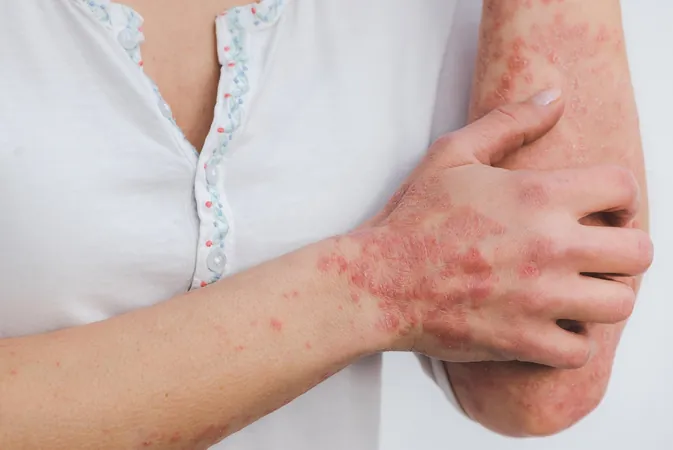
New Study Reveals Shocking Connection Between Stress and Psoriasis Relapses
2024-09-26
Connection Between Stress and Psoriasis
Groundbreaking research has unveiled a startling link between perceived stress and the resurgence of psoriatic skin lesions, a revelation that could transform treatment approaches for millions suffering from this chronic condition. Presented at the prestigious European Academy of Dermatology and Venereology (EADV) Congress 2024, this study is a pioneering effort to validate the relationship between stress and psoriasis through in vivo methods.
Impact of Psoriasis
Psoriasis is not just a cosmetic issue; it impacts over 6 million people across Europe. This chronic skin disorder is characterized by rapid skin cell production, leading to painful scaling and inflammation. While the connection between stress and worsening psoriasis has long been suspected, solid scientific evidence has been elusive—until now.
The Study Methodology
In this innovative study, researchers induced psoriatic lesions in human skin grafts implanted in severe combined immunodeficiency (SCID) mice. After the skin lesions went into remission due to topical dexamethasone treatment, the subjects were subjected to "sonic stress," a type of auditory stimulation, for 24 hours, while others were given a sham treatment.
Results and Findings
The results were nothing short of dramatic: all human skin grafts exposed to sonic stress experienced a resurgence of psoriatic lesions within just 14 days. This relapse was correlated with notable changes in skin dynamics, including increased epidermal thickness, heightened markers for keratinocyte proliferation, and immune cell activation—all indications that the inflammation associated with psoriasis had been reignited.
Immune Responses to Stress
Complex immune responses unfolded as a result of sonic stress, which included significant increases in proinflammatory mediators like CXCL10, IL-22, and TNFα, as well as neurogenic inflammation biomarkers such as nerve growth factor (NGF) and substance P (SP). These findings suggest that stress-induced neuropeptides play a critical role in aggravating skin conditions like psoriasis.
Expert Insights
Professor Amos Gilhar, the lead researcher from the Technion-Israel Institute of Technology, elaborates on the mechanisms at play, stating, “Psychological stress leads to the triggering of neuropeptides such as substance P, which subsequently activates the immune cells, worsening skin inflammation in susceptible individuals.”
Potential Treatment with Aprepitant
The research team did not stop there. They investigated how effectively aprepitant, an FDA-approved medication traditionally used to combat nausea, could prevent relapses of psoriasis caused by stress. Remarkably, aprepitant thwarted relapse in 80% of the cases tested and restored many of the inflammatory markers back to normal levels.
Future Directions
This transformative research signals a hopeful new frontier for psoriasis sufferers, emphasizing the importance of addressing psychological factors in medical treatment and inviting further exploration into integrative healthcare approaches. As Professor Gilhar reflects, “Our study reinforces the need to understand how stress influences psoriasis, paving the way for refined treatment strategies that enhance patient care. We are eager to explore the therapeutic potential of NK-1 receptor antagonists while further investigating the roles of stress management in psoriasis care.”
Conclusion
This groundbreaking study may redefine how we manage this debilitating condition. Are we on the brink of a breakthrough that could redefine how we manage this debilitating condition? Only time will tell.


 Brasil (PT)
Brasil (PT)
 Canada (EN)
Canada (EN)
 Chile (ES)
Chile (ES)
 España (ES)
España (ES)
 France (FR)
France (FR)
 Hong Kong (EN)
Hong Kong (EN)
 Italia (IT)
Italia (IT)
 日本 (JA)
日本 (JA)
 Magyarország (HU)
Magyarország (HU)
 Norge (NO)
Norge (NO)
 Polska (PL)
Polska (PL)
 Schweiz (DE)
Schweiz (DE)
 Singapore (EN)
Singapore (EN)
 Sverige (SV)
Sverige (SV)
 Suomi (FI)
Suomi (FI)
 Türkiye (TR)
Türkiye (TR)